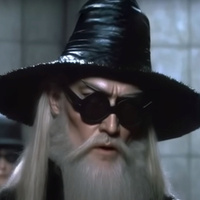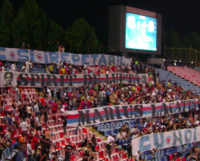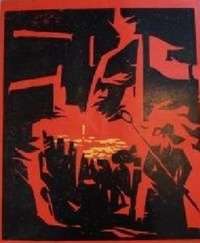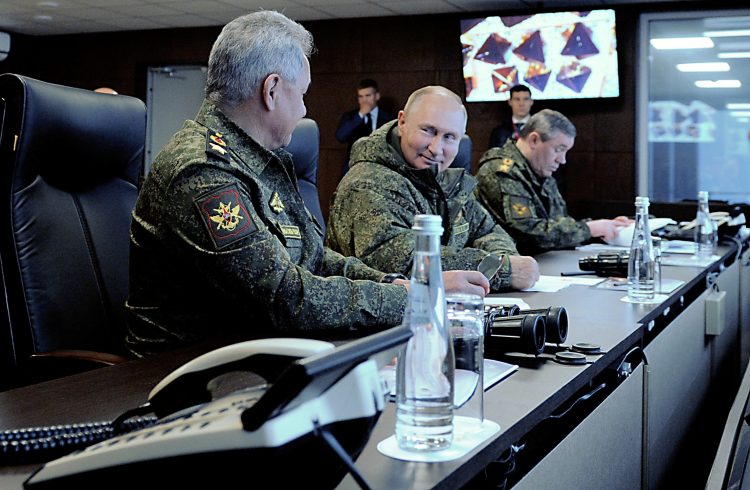Rusija i sve vezano za nju

- Posts : 7692
Join date : 2020-03-05
- Post n°951
 Re: Rusija i sve vezano za nju
Re: Rusija i sve vezano za nju
"Ako nas naljutite, stavicemo balvan na autoput za Istanbul i preprečićemo Dunav. E tako da im kažemo, pa nek se češe gde ih ne svrbi. Aj živeli."
_____
"Burundi je svakako sharmantno mesto cinika i knjiskih ljudi koji gledaju stvar sa svog olimpa od kartona."
“Here he was then, cruising the deserts of Mexico in my Ford Torino with my wife and my credit cards and his black-tongued dog. He had a chow dog that went everywhere with him, to the post office and ball games, and now that red beast was making free with his lion feet on my Torino seats.”

- Posts : 35869
Join date : 2012-02-10
- Post n°952
 Re: Rusija i sve vezano za nju
Re: Rusija i sve vezano za nju
"Zavrnucemo vam kokain"
_____
★
Uprava napolje!

- Posts : 7692
Join date : 2020-03-05
- Post n°953
 Re: Rusija i sve vezano za nju
Re: Rusija i sve vezano za nju
"Ugasićemo Rio Tinto i onda ćao mobilni telefoni, slaćete golube pismonoše"
_____
"Burundi je svakako sharmantno mesto cinika i knjiskih ljudi koji gledaju stvar sa svog olimpa od kartona."
“Here he was then, cruising the deserts of Mexico in my Ford Torino with my wife and my credit cards and his black-tongued dog. He had a chow dog that went everywhere with him, to the post office and ball games, and now that red beast was making free with his lion feet on my Torino seats.”

- Posts : 52640
Join date : 2017-11-16
- Post n°954
 Re: Rusija i sve vezano za nju
Re: Rusija i sve vezano za nju
Tovar wrote:Mór Thököly wrote:Srpski "vladari" imaju 1 pojavu dugog trajanja. Oni nekako, ne znam kako, misle da migu da kontrolisu uticaj velikih sila na ove prostore. To je stravicna zabluda koja je placena stotinama hiljada zivota i jos svacega. Ovaj nas misli da moze da se "dogovara" bilo sa US bilo sa Rusijom kako ce oni tacno postupati sa Srbijom i okolinom. Ja ne znam kako to da nazovem uopste.
Paralelni svemir?
Može


- Posts : 52640
Join date : 2017-11-16
- Post n°955
 Re: Rusija i sve vezano za nju
Re: Rusija i sve vezano za nju
- thinking: dao sam licne karte, zabranicu prajd, toeto.
US: mora i prajd
Rusija: boli nas qrac za licne karte
US: mora i prajd
Rusija: boli nas qrac za licne karte

- Posts : 82800
Join date : 2012-06-10
- Post n°956
 Re: Rusija i sve vezano za nju
Re: Rusija i sve vezano za nju
Mór Thököly wrote:Srpski "vladari" imaju 1 pojavu dugog trajanja. Oni nekako, ne znam kako, misle da migu da kontrolisu uticaj velikih sila na ove prostore. To je stravicna zabluda koja je placena stotinama hiljada zivota i jos svacega. Ovaj nas misli da moze da se "dogovara" bilo sa US bilo sa Rusijom kako ce oni tacno postupati sa Srbijom i okolinom. Ja ne znam kako to da nazovem uopste.
Ja mislim da to zaista nije Vucicev problem. Stavise, mislim da je on, upravo suprotno, apsolutno prilagodljiv, i da je to do sada igralo u njegovu korist. Sad mu je problem sto vise ne moze da se prilagodi svima, a ne sme, a mozda i ne ume, da presece.
_____
"Oni kroz mene gledaju u vas! Oni kroz njega gledaju u vas! Oni kroz vas gledaju u mene... i u sve nas."
Dragoslav Bokan, Novi putevi oftalmologije

- Posts : 52640
Join date : 2017-11-16
- Post n°957
 Re: Rusija i sve vezano za nju
Re: Rusija i sve vezano za nju
Vest je, ali ima i kod njega ta linija. Mada to je u SRN-Staatu strukturni problem. Mada, cesto je i bio takav. A krize naracni da ce kad tad doci.

- Posts : 8696
Join date : 2016-10-04
- Post n°958
 Re: Rusija i sve vezano za nju
Re: Rusija i sve vezano za nju
Ако је Бетић поделио први онда је јасна ствар. Вероватно је платио да пусте оглас на билборду у одређено време, затим донео камеру са стативом на добро место, подесио камеру и пустио да снима у одређено време. А затим пласирао преко нета.rumbeando wrote:Nešto duži i bolji snimak (720p, oko 2,5 Mbps) sa sve prethodnom i sledećom reklamom je još juče, dakle dosta pre ovog Albanca s Tvitera, podelio onaj snajperista Berić što ratuje za Ruse u Donbasu na svom Telegram kanalu.

- Posts : 19277
Join date : 2014-12-12
- Post n°959
 Re: Rusija i sve vezano za nju
Re: Rusija i sve vezano za nju
Mór Thököly wrote:- thinking: dao sam licne karte, zabranicu prajd, toeto.
US: mora i prajd
Rusija: boli nas qrac za licne karte


- Posts : 82800
Join date : 2012-06-10
- Post n°960
 Re: Rusija i sve vezano za nju
Re: Rusija i sve vezano za nju
https://www.spiegel.de/international/germany/hackers-spies-and-contract-killers-how-putin-s-agents-are-infiltrating-germany-a-2cc6c24c-16ac-43d4-97fa-103081414acc
_____
"Oni kroz mene gledaju u vas! Oni kroz njega gledaju u vas! Oni kroz vas gledaju u mene... i u sve nas."
Dragoslav Bokan, Novi putevi oftalmologije

- Posts : 52640
Join date : 2017-11-16
- Post n°961
 Re: Rusija i sve vezano za nju
Re: Rusija i sve vezano za nju
— Max Fras (@maxfras) September 4, 2022

- Posts : 37709
Join date : 2014-10-27
- Post n°962
 Re: Rusija i sve vezano za nju
Re: Rusija i sve vezano za nju
kada sam ja napisao da ce pjutin biti sijev lukasenko neki su se smejali. tako su smejali i onom sto je izmislio gravitaciju.
_____
And Will's father stood up, stuffed his pipe with tobacco, rummaged his pockets for matches, brought out a battered harmonica, a penknife, a cigarette lighter that wouldn't work, and a memo pad he had always meant to write some great thoughts down on but never got around to, and lined up these weapons for a pygmy war that could be lost before it even started

- Posts : 28265
Join date : 2015-03-20
- Post n°963
 Re: Rusija i sve vezano za nju
Re: Rusija i sve vezano za nju
Vilmos Tehenészfiú wrote:Ovo. Državne plate sa srednjom stručnom spremom (med sestra) hiljadu maraka, plata u društvenom sektoru, visoka stručna sprema (Energoprojekt) pet stotina maraka. Ko je tu lud?kapetanm wrote:Hm. Radio sam tad u privredi. Antin anacionalni pristup vladanju je bio za pozdraviti dok je ekonomski, cak i da ga nisu saplitali, bio na duze staze neodrziv. U stvari on je prvi uveo helikopter plate
nemo se blamiraš, nemaš pojma o platama
_____
#FreeFacu
Дакле, волео бих да се ЈСД Партизан угаси, али не и да сви (или било који) гробар умре.

- Posts : 8095
Join date : 2020-09-07
- Post n°964
 Re: Rusija i sve vezano za nju
Re: Rusija i sve vezano za nju
So if you’re looking for the roots of Russia’s violence against its neighbors, its desire to erase their history, and its rejection of the ideas of liberal democracy, you will find some of the answers on the pages of Pushkin, Lermontov, and Dostoevsky.
foreignpolicy.com
- Spoiler:
Russian Literature Is Full of Imperial Ideology
Russian classical literature, chock full of dehumanizing nationalism, reads disturbingly familiar today.
By Volodymyr Yermolenko
Updated Jul. 08, 2022 09:18 AM
One of the streets in Hoholiv—a town just east of Ukraine’s capital, Kyiv—bears the name of Mikhail Lermontov, a 19th-century Russian poet. Lermontov never visited Ukraine, and only a few of his poems touch on Ukrainian topics. But streets all over Ukraine are still named for him and other Russian cultural figures, a heritage of its Soviet imperial past. Hoholiv, which saw heavy fighting in March, similarly honors Anton Chekhov, Vladimir Mayakovsky, and Aleksandr Pushkin. Naming streets in every city, town, and village is just one instrument for an empire to designate and control its colonial space. Every prominent Russian name was a way to exclude a Ukrainian one. Street names were a tool to erase local memory.
Russia’s literary greats, however, didn’t just lend their names to their country’s imperial project. Much more than is commonly recognized, their writings also helped shape, transport, and ingrain Russia’s imperial ideology and nationalist worldview.
What about Lermontov? He has a specific image in Russian literature as a writer, soldier, womanizer, and romantic poet. He conjured idyllic images of the Caucasus, which had captured his imagination like so many other famous Russian writers. Like Pushkin, he died dramatically in a duel.
But behind the romanticism of the early 19th century, there is something else: the cold grip of an empire. Lermontov’s most famous poem—Mtsyri or “The Novice,” written in 1839—is an idyllic account of a Caucasian monk taken prisoner by a Russian army officer as a boy. The poem’s key emotion is a feeling of hopelessness: The proud and glorious history of the people of the Caucasus is in the past and gone forever, and the main character’s nostalgia for a lost past tells us that he belongs to the defeated side of humanity. In Ulansha, Lermontov’s early obscene poem, he recounts the collective rape of a woman by Russian soldiers; the text does not seem to have any visible sign of sympathy for the victim. Another poem, Kavkazets (“Caucasian”), hints that the true Caucasians aren’t the natives but the Russian soldiers who conquered the region in the early 19th century—just like Soviet soldiers sent to invade and occupy Afghanistan were colloquially called “Afghanis.”
Just as Lermontov constructed an imperial, colonialist Russian perspective on the Caucasus, Pushkin did so on Ukraine. Take Poltava, Pushkin’s poem about Ivan Mazepa, the Ukrainian hetman who rebelled against then-Tsar Peter the Great as he was tightening Russian control over Ukraine (and whom Russian President Vladimir Putin just invoked in a speech about regaining the lands of the Russian empire). For Ukrainians, Mazepa is a symbol of national resistance against Russian domination and a reminder that tsarist Russia broke a 17th-century treaty preserving the Cossacks’ (future Ukrainians’) autonomy in return for allegiance to the Muscovites (future Russians). For Ukrainians, Peter broke the deal; for Russians, any Ukrainian claim of autonomy was treachery—just as it is for Putin now. Pushkin takes the Russian view by depicting Mazepa as a lecherous traitor who would “spill blood as soon as water.” Ukrainians are to be pitied and despised, the poem suggests, as “friends of old and bloody times.”
Once you begin to look for it, you’ll find Russian literature chock full of imperialist discourse, romanticized conquest and cruelty, and silence about the consequences.
You will find the same message in Russian writer Nikolai Gogol’s famous historical novella about Ukraine: Taras Bulba. When Gogol—Ukrainian by birth—switched his identity to a Russian imperial one, he spent much of his talent to prove that all things Ukrainian are obsolete and, more importantly, cruel. In Gogol’s telling, they need the Russian empire so they can become civilized.
There was, of course, an alternative way of looking at things. A few years after Gogol and Pushkin crafted their image of the Ukrainian Cossacks as part of an obsolete and cruel past, Taras Shevchenko—a Ukrainian poet, painter, and national hero—was telling his compatriots that the Cossacks’ anti-tyrannical and proto-democratic spirit wasn’t a relic from the past but a harbinger of the future. Shevchenko’s view of the Caucasus was similarly different from Lermontov’s: not an idyllic landscape where romanticized Russian domination has erased history but a highly dramatic scene where imperial violence produces rivers of blood and resistance is strong and uncompromising. Boritesya—poborete (“Fight, and you will win”), Shevchenko’s iconic slogan of rebellion against tyranny, comes from his poem Kavkaz (“Caucasus”) and is equally applicable to the Caucasian and Ukrainian struggles against Russia’s imperial power. While Lermontov’s Caucasus is snow-white, idyllically cold, and remote from human suffering, Shevchenko’s Caucasus is blood-red and immersed in humanity’s battle for freedom. Lermontov writes a poem about a collective rape from the Russian perpetrators’ perspective; Shevchenko’s returning image is that of a pokrytka—Ukrainian for “fallen woman.” His provocative religious poem Mariia (“Mary”) draws a parallel between a Ukrainian pokrytka who bears an illegitimate child from a Muscovy soldier, perhaps after a rape, and the mother of Jesus—as lonely, suffering mothers. Empathy toward women who suffered sexual violence is Shevchenko’s response to Lermontov’s poetization of rape—where, in both cases, the perpetrator is Russian and the victim is a conquered subject.
Once you begin to look for it, you’ll find Russian literature chock full of imperialist discourse, romanticized conquest and cruelty, and silence about the consequences. Even if the work is ostensibly sympathetic toward the imperial subject, like Taras Bulba or Mtsyri, this empathy is a romantic notion about the subject’s sad destiny of eternal backwardness and subjugation. At the same time that European orientalism was developing an image of African and Asian societies as having no history worth telling, Russian literature was constructing an image of the Caucasus and Ukraine as societies whose violent histories deserved to be forgotten.
The parallels to today’s Russian politics of conquest are deep and wide. Pushkin’s “To the Slanderers of Russia” is a remarkable example of an anti-European pamphlet channeling aggressive Russian imperialism. His treatment of the 1830-1831 Polish uprising is in some ways similar to the Kremlin’s current view of the so-called color revolutions in the former Soviet empire. Pushkin openly threatens Europe with war (“Have we forgot to conquer yet?”) and reminds readers of the enormity of Russian power and conquests (“From the hot Colchian steppes, to Finland’s icy mountains”). There is a straight line from Pushkin’s ideology to today’s neo-imperial rhetoric. One of the Russian slogans during the Russia-Ukraine war has been “we can repeat”—deliberately recalling past wars of destruction and conquest to intimidate Russia’s imagined enemies. Similarly, Russian poet and Pushkin contemporary Fyodor Tyutchev, at the time of Europe’s 1848 revolutions, celebrated the Russian empire as Europe’s bulwark to prevent dangerous democracy from breaking out—just like Russia is today the authoritarian model for (and supporter of) anti-democratic forces on the right and left in Europe.
When Western scholars present the golden age of Russian literature in the 19th century as an intellectual struggle between Westernizers and Slavophiles, they miss the nationalist and imperialist undercurrents common to both. Even the so-called Westernizers believed in Russian exceptionalism, often turned into radical opponents of what they thought liberal Europe stood for, and frequently cherished a tyrannical model of society. Few authors better illustrate this phenomenon than Russian novelist Fyodor Dostoevsky, who turned from socialist radical in his youth to religious fundamentalist later in life. He famously said Russian socialists and communists were “not Europeans” and “will end in becoming a true Russian”—in other words, end up rejecting the West. In the novel Demons, Dostoevsky describes Western ideas as “demonic” seductions to be condemned.
Regardless of whether these writers superficially embraced Western ideas or not, their ethnonationalist, imperial prism helped lead Russia to more tyranny, not less. Dropped onto Russian soil, even Western progressive ideas morphed into a new and stronger tyranny—whether under Russia’s great modernizer Peter the Great or the Bolsheviks, whose murderous tyranny was built on European socialist ideas.
All these things continue today. When Russia destroyed Chechnya in the 1990s, sparked artificial separatist struggles in Moldova and Georgia in the 1990s, invaded Georgia in 2008, and invaded Ukraine in 2014, these acts of brutality had their intellectual underpinnings in the great Russian literary classics and their authors’ attitudes toward the empire’s colonies and conquests. To this day, these authors and their works are telling Russians that there is nothing to respect in the lands occupied by Russian soldiers. When Pushkin depicted Ukrainian Cossacks as bloody and cruel, this was just the 19th-century version of today’s propaganda narrative about Ukrainians as alleged Nazis whose historical fate is death and submission. When Tyutchev presents 19th-century Russia as Europe’s glorious savior from democracy, he is echoed in Putin’s fight to overturn color revolutions in Ukraine and elsewhere.
Of course, Russian culture is no single cause for Russian crimes, and the connection between culture and politics is never linear. But it is naive to think that Russian culture is innocent and free from the imperialist discourse that has been at the core of Russian politics for centuries. And although Western universities study imperialism and orientalism in Western literary canon—novelists Gustave Flaubert, Rudyard Kipling, and Joseph Conrad immediately come to mind—they have almost completely ignored similar strains in the literature of the world’s last unreconstructed colonial empire, which is fighting another war of imperial conquest as I write.
So if you’re looking for the roots of Russia’s violence against its neighbors, its desire to erase their history, and its rejection of the ideas of liberal democracy, you will find some of the answers on the pages of Pushkin, Lermontov, and Dostoevsky.
One of the streets in Hoholiv—a town just east of Ukraine’s capital, Kyiv—bears the name of Mikhail Lermontov, a 19th-century Russian poet. Lermontov never visited Ukraine, and only a few of his poems touch on Ukrainian topics. But streets all over Ukraine are still named for him and other Russian cultural figures, a heritage of its Soviet imperial past. Hoholiv, which saw heavy fighting in March, similarly honors Anton Chekhov, Vladimir Mayakovsky, and Aleksandr Pushkin. Naming streets in every city, town, and village is just one instrument for an empire to designate and control its colonial space. Every prominent Russian name was a way to exclude a Ukrainian one. Street names were a tool to erase local memory.
Russia’s literary greats, however, didn’t just lend their names to their country’s imperial project. Much more than is commonly recognized, their writings also helped shape, transport, and ingrain Russia’s imperial ideology and nationalist worldview.
What about Lermontov? He has a specific image in Russian literature as a writer, soldier, womanizer, and romantic poet. He conjured idyllic images of the Caucasus, which had captured his imagination like so many other famous Russian writers. Like Pushkin, he died dramatically in a duel.
foreignpolicy.com
_____
Sweet and Tender Hooligan

- Posts : 7692
Join date : 2020-03-05
- Post n°965
 Re: Rusija i sve vezano za nju
Re: Rusija i sve vezano za nju
Kasno si stigao na topik, sad ponovo pričamo o Rusiji.kondo wrote:Vilmos Tehenészfiú wrote:
Ovo. Državne plate sa srednjom stručnom spremom (med sestra) hiljadu maraka, plata u društvenom sektoru, visoka stručna sprema (Energoprojekt) pet stotina maraka. Ko je tu lud?
nemo se blamiraš, nemaš pojma o platama
_____
"Burundi je svakako sharmantno mesto cinika i knjiskih ljudi koji gledaju stvar sa svog olimpa od kartona."
“Here he was then, cruising the deserts of Mexico in my Ford Torino with my wife and my credit cards and his black-tongued dog. He had a chow dog that went everywhere with him, to the post office and ball games, and now that red beast was making free with his lion feet on my Torino seats.”

- Posts : 41708
Join date : 2012-02-12
Location : wife privilege
- Post n°966
 Re: Rusija i sve vezano za nju
Re: Rusija i sve vezano za nju
boomer crook wrote:kada sam ja napisao da ce pjutin biti sijev lukasenko neki su se smejali. tako su smejali i onom sto je izmislio gravitaciju.
Ајде, а шта су радили пре гравитације, лебдели?
_____
the more you drink, the W.C.
И кажем себи у сну, еј бре коњу па ти ни немаш озвучење, имаш оне две кутијице око монитора, видећеш кад се пробудиш...

- Posts : 10463
Join date : 2020-06-19
- Post n°967
 Re: Rusija i sve vezano za nju
Re: Rusija i sve vezano za nju
Journalist Ivan Safronov was sentenced to 22 years in prison. This is an impossible punishment. "I'll write to everyone. Keep writing to me. I love you!", Safronov shouted before he was escorted out of the hall.
— Free Russia Foundation 4freerussia.org (@4freerussia_org) September 5, 2022
We demand the immediate release of Ivan Safronov! #FreeSafronov pic.twitter.com/zPmurPepCs
ФСБ је утврдио да је Сафронов западним обавештајним агенцијама давао тајне информације о космичкој обавештајној и војно-техничкој сарадњи Русије и других земаља. Истовремено, публикација Проект (препозната као непожељна организација) сазнала је да су готово све „тајне информације“ биле у јавном домену – на пример, на Википедији и у медијским публикацијама, укључујући и владине.
Поред тога, новинари Би-Би-Сија су известили да је кривични случај против Сафронова повезан са његовим објављивањем у Комерсанту 2019. Текст је био посвећен снабдевању Египта Су-35 и изазвао је скандал у земљи. Након тога, како преноси Би-Би-Си, египатски аташе за одбрану затражио је од Москве да „предузме мере да демантује” ту вест, а као резултат тога, Сафронов је стављен под присмотру по члану о издаји.
Непосредно пре пресуде адвокат новинара рекао је да је тужитељка Елвира Зочик понудила Сафронову да се изјасни кривим у замену за казну од 12 година. Међутим, он је одбио такав договор.
_____
Međuopštinski pustolov.
Zli stolar.

- Posts : 37709
Join date : 2014-10-27
- Post n°968
 Re: Rusija i sve vezano za nju
Re: Rusija i sve vezano za nju
паће wrote:boomer crook wrote:kada sam ja napisao da ce pjutin biti sijev lukasenko neki su se smejali. tako su smejali i onom sto je izmislio gravitaciju.
Ајде, а шта су радили пре гравитације, лебдели?
_____
And Will's father stood up, stuffed his pipe with tobacco, rummaged his pockets for matches, brought out a battered harmonica, a penknife, a cigarette lighter that wouldn't work, and a memo pad he had always meant to write some great thoughts down on but never got around to, and lined up these weapons for a pygmy war that could be lost before it even started

- Posts : 82800
Join date : 2012-06-10
- Post n°969
 Re: Rusija i sve vezano za nju
Re: Rusija i sve vezano za nju



Outpaćed!
_____
"Oni kroz mene gledaju u vas! Oni kroz njega gledaju u vas! Oni kroz vas gledaju u mene... i u sve nas."
Dragoslav Bokan, Novi putevi oftalmologije

- Posts : 41708
Join date : 2012-02-12
Location : wife privilege
- Post n°971
 Re: Rusija i sve vezano za nju
Re: Rusija i sve vezano za nju
_____
the more you drink, the W.C.
И кажем себи у сну, еј бре коњу па ти ни немаш озвучење, имаш оне две кутијице око монитора, видећеш кад се пробудиш...

- Posts : 19277
Join date : 2014-12-12
- Post n°972
 Re: Rusija i sve vezano za nju
Re: Rusija i sve vezano za nju
https://pescanik.net/gorbacov-gubitnik-bez-razloga/

- Posts : 15576
Join date : 2016-03-28
- Post n°973
 Re: Rusija i sve vezano za nju
Re: Rusija i sve vezano za nju
Jebem te patetiko, stvarno zapadne kmetove smatraju za imbecilebeatakeshi wrote:https://pescanik.net/gorbacov-gubitnik-bez-razloga/

_____
Što se ostaloga tiče, smatram da Zapad treba razoriti
Jedini proleter Burundija
Pristalica krvne osvete

- Posts : 52640
Join date : 2017-11-16
- Post n°974
 Re: Rusija i sve vezano za nju
Re: Rusija i sve vezano za nju
Today our colleagues who have already been murdered by this state for doing their professional duty - Igor Domnikov, Yuri Shchekochikhin, Anna Politkovskaya, Stanislav Markelov, Anastasia Baburova, Natalia Estemirova, Orkhan Dzhemal - were killed again.
— Robyn Dixon (@RobynDixon__) September 5, 2022

- Posts : 11662
Join date : 2018-03-03
Age : 36
Location : Hotline Rakovica
- Post n°975
 Re: Rusija i sve vezano za nju
Re: Rusija i sve vezano za nju

Kako se napumpao lik.
_____
Sve čega ima na filmu, rekao sam, ima i na Zlatiboru.
~~~~~
Ne dajte da vas prevare! Sačuvajte svoje pojene!



 Vilmos Tehenészfiú
Vilmos Tehenészfiú by Vilmos Tehenészfiú Fri Sep 02, 2022 6:07 pm
by Vilmos Tehenészfiú Fri Sep 02, 2022 6:07 pm

